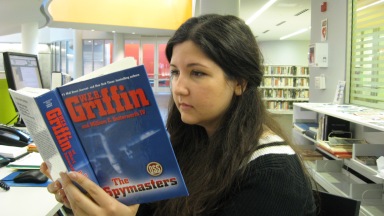At the 2012 ILA Conference in Peoria, a librarian told me about a frustrating experience she’d had. She’d tried to convince a young man in his ’20′s that the library had relevance for him. She was unsuccessful. She told me the story, and turning to me, she asked, “What’s the benefit?”"What’s the benefit?” is a phrase that comes to us from advertising, and I think what she meant was, “what could I have said to this young man that would have persuaded him to come into the library?” I’m afraid I was completely unprepared for this question, although I shouldn’t be: it seems to come up every so often.
On another recent occasion, I found myself making conversation with the man who helped me when I ran out of gas. I asked him about his reading, and he said that he had a Kindle, that he liked to read W.E.B. Griffin, and that he saw no need for libraries in the future because everyone would be using an e-reader. I should have said something to contradict him, immediately, but I didn’t. I didn’t have an answer, or “a benefit,” for him, either.
After some thought, I’ve realized that thinking about market segmentation for guys in creating an elevator speech is a way to respond to these particular challenges. For the kinds of real-life encounters I’ve described, it’s good to be prepared with an “elevator speech,” a list of two to three items you can talk about at a moment’s notice. To create this ready-made answer, it’s important to think a little about market segmentation.
Market segmentation is a marketing strategy that involves dividing a broad audience, like the users of a library, into subsets of customers with common tastes or needs. Having a teen department is an example of market segmentation.
Identify the library’s market segments and identify the products most likely to excite that segment. In the case of preparing an “elevator speech,” it’s even more important to think about the male segment. Men are more frequently not users of libraries, so it is more important to be prepared with a short list of items likely to appeal to men.
I should have suggested to my colleague at ILA that in a similar situation she could offer an elevator speech of two to four items, something like, “There’s a lot for guys your age at the library: videos, CDs, video games and graphic novels.”
I should have suggested to the man with the Kindle that, with a librarian as his guide, he might discover many other authors that might interest him. I might have said to him, ”If you enjoy Griffin you might enjoy knowing you can “check out” Griffin books on your ereader for free from the library website.” If he were a commuter, he might enjoy listening to Griffin on audiobook. And if he ran out of books to read, he could turn to his librarian for suggestions for new, but similar, authors to read.
One of my favorite examples of market segmentation I learned about from Building a Buzz: Libraries & Word of Mouth Marketing. The director of a library in Wyoming visited car shops in her community, distributing posters and stickers on the Chilton’s car repair database that featured the “Mudflap Girl” of truck mudflap fame, now shown reading a book. The guys in the repair shops found it funny, while some librarians questioned its taste. But it sparked a lot of discussion, and the uses of the Chilton’s database jumped to 800 a month.Use market segmentation to think about who your audience is and make your marketing appealing and accessible to that segment. When I organized a job fair for my library, I asked myself where I could find job seekers and then publicized the event at the unemployment office and the Township’s job club.
Men and boys are often underrepresented among the users of libraries, and perhaps are the most likely to believe that the library has nothing for them. Considering them as a market segments will be the first step in converting them into regular users. Identify the products that appeal to them, and get your elevator speech on – promote those products for given in ways that are likely to reach them, and enjoy the pleasure of bringing library patrons together with the things they love!
I would love to hear from you in the comments! Let me know what kind of elevator speech you use to promote your library? Do you have more than one? Which has proved to be most effective?
Elizabeth Neill is the Outreach Librarian at the Poplar Creek library.



